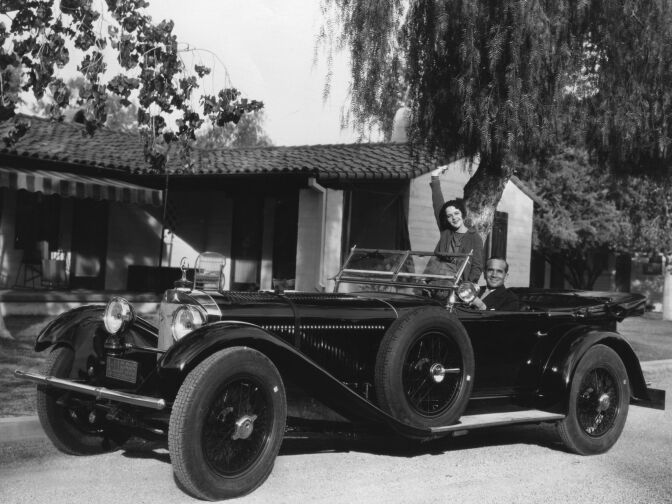This story is free to read because readers choose to support LAist. If you find value in independent local reporting, make a donation to power our newsroom today.
For Actress Ruby Keeler, Another Opening, Another Show

Ruby Keeler was an unknown actress when she starred in the 1933 production of Busby Berkeley's 42nd Street.
But the movie was so popular she was able to land two more splashy musicals that same year — and seven more by the end of the decade. There was nothing extraordinary about her talents as a vocalist or as an actress, but audiences of the Depression era really bought into Keeler's "innocent" onstage persona. In fact, they craved it.
Her life story was also a source of optimism for many during bleak times. She had truly earned her way to stardom, rather than being born into it. And unlike more graceful, natural performers, she had to work hard when she was onstage. They loved that about her.
But while Keeler was a huge star during the '30s, as the decade wound down, so did her career. Her marriage to Al Jolson came unraveled, and in 1940, she remarried outside Hollywood to a wealthy real estate broker and retired from showbiz — for what she thought would be forever.
Thirty years later, the nation had survived World War II, a baby boom, television, Elvis, the civil rights movement, a presidential assassination, the Beatles, anti-war demonstrations, hippies, and astronauts walking on the moon.
Basically, there were a lot of reasons to forget about Ruby Keeler.
But she had come back, this time as a 61-year-old grandmother, performing in No, No, Nanette — a creaky old '20s musical that centers on a young flapper. The Broadway producer told her that if she agreed to do the play, she'd only have to do two musical numbers.

From the very first preview in Boston, the audience greeted Keeler like an old friend, as she told an interviewer on opening night. What the people in the audience hadn't imagined was what it would do to them: Seeing her was like a fountain of youth.
Especially when they realized she'd put on her tap shoes.
A New York Times critic described the audience response to Keeler as "part nostalgia, part astonishment" at this model of "sobriety" hoofing with chorus boys half her age who were wearing sweaters so bright and zigzaggy, they looked like "a trainload of tigers struck by lightning." Madness was all around her, said the critic, but there was no madness to the diligent, dutiful kid who'd gone out there a youngster and was coming back a star.
Comebacks are usually about reinvention, but not this one. Keeler still couldn't act or sing. But she worked hard up there onstage, just as she had on-screen, and when audiences saw her, they remembered the determined Depression-era youngster, and their own determined Depression-era youth.
Outside the theater were things like Vietnam, psychedelia, all manner of the new. But up onstage, Keeler was as she'd always been. Eight shows a week through two years on Broadway and another two on the road. Working hard to make people happy, and fueling a nostalgia craze — one that would permeate 1970s entertainment much as the counterculture had the 1960s.
Copyright 2023 NPR. To see more, visit https://www.npr.org. 9(MDA1OTI3MjQ5MDEyODUwMTE2MzM1YzNmZA004))








